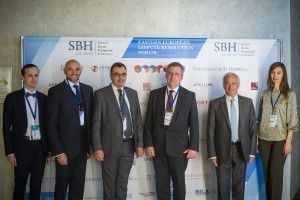Commercial Dispute Resolution in Eastern Europe: Debugging the Mechanisms
 One may compare arbitration with a car: it may be luxurious or modest, but to run it you always need four properly functioning wheels: arbitral institutions, parties, arbitrators and state courts. Tetiana Slipachuk, managing partner of Sayenko Kharenko law firm, reminded us of this while moderating the first arbitration section of the first Eastern European Dispute Resolution Forum held in Minsk (Belarus) on 23 September. The event speakers and other participants discussed these “four wheels” and agreed that the “arbitration car” in Eastern Europe generally remains in good order. The Forum gathered leading dispute resolution experts who shared their views on the latest legislation and discussed current issues such as emergency arbitration, third party funding of litigation, measures to achieve procedural economy, service of foreign parties, interim measures, enforcement of foreign judgments and arbitral awards against state companies.
One may compare arbitration with a car: it may be luxurious or modest, but to run it you always need four properly functioning wheels: arbitral institutions, parties, arbitrators and state courts. Tetiana Slipachuk, managing partner of Sayenko Kharenko law firm, reminded us of this while moderating the first arbitration section of the first Eastern European Dispute Resolution Forum held in Minsk (Belarus) on 23 September. The event speakers and other participants discussed these “four wheels” and agreed that the “arbitration car” in Eastern Europe generally remains in good order. The Forum gathered leading dispute resolution experts who shared their views on the latest legislation and discussed current issues such as emergency arbitration, third party funding of litigation, measures to achieve procedural economy, service of foreign parties, interim measures, enforcement of foreign judgments and arbitral awards against state companies.
The Eastern European Dispute Resolution Forum constituted the first and the largest practical Forum held in Belarus, which united different jurisdictions including Latvia, Lithuania, Kazakhstan, Poland, Russia and Ukraine. The Forum aimed to discuss the most relevant trends and practices arising at the moment in the sphere of dispute resolution in the CIS and Eastern Europe. SBH Law Office was the General partner of the event. Russian, Ukrainian and Baltic international firms such as FORT Legal, Integrities participated. CIS Arbitration Forum was one of the event’s information sponsors.
International arbitration in Eastern Europe should develop freely from external matters
Chairman of the ICAC at the Russian Chamber of Commerce and Industry Alexey Kostin noted that international arbitration succeeds where it does not mix external matters, such as international politics, into its operation. Arbitration remains the domain of professionals and serves trade since immemorial time, he noted. As a general trend of arbitration in Eastern Europe Mr. Kostin mentioned the proliferation of respectable and transparent arbitral institutions with lists of highly qualified arbitrators. The chairs of leading international arbitral institutions in the region shared the opinion that lists of recommended arbitrators remain necessary to ensure the quality of arbitral proceedings. Many of them admitted that a person appointed by a party may take part as an arbitrator even if not included in the list. However, chairman of the IAC at the Belarusian Chamber of Commerce and Industry Ian Funk expressed his desire that this happen “as rarely as possible” because of the risk the arbitrator not included in the recommended list undertakes some unpredictable and improper actions during the arbitral proceedings.
Alexey Kostin said that the ICAC keeps an open list of arbitrators since 1995. Malgorzata Surdek, member of the Nominating Committee at the Lewiatan Court of Arbitration (Warsaw, Poland), advocated for open lists of arbitrators. But Tetiana Zakharchenko, Vice President of the ICAC and MAC at the Ukrainian Chamber of Commerce and Industry, gave an example from the ICAC’s practice: after the court rejected the party’s appointment of a certain person as an arbitrator, that party engaged the same person as its representative at the same arbitral proceedings. Tetiana concluded that as long as the legal culture of the parties to arbitration remains rather low, the courts will still keep a closed list of arbitrators.
Challenges that arbitral institutions face
The main challenge of establishing a new arbitral institution consists in persuading its users of its qualified and impartial procedure. Thus Vytautas Nekrosius, chairman of Vilnius Court of Commercial Arbitration, in this regard recalled a time when this institution started its operations in 1996. He admitted that it immediately became crucial to dissuade business entities from perceiving it as a marketplace of arbitral awards “bought and sold”. The court achieved this by thorough case-by-case work, with its average workload now equaling to 20-40 cases annually, while one case amount exceeds 100 mln euros. The popularity of arbitral institutions also depends on the economic situation.
Tetiana Zakharchenko reported that in 2015 the ICAC at the Ukrainian Chamber of Commerce and Industry admitted a record number of arbitration claims – more than 900 (with ordinary annual caseload 250-450 disputes) – as result of proliferation of substantive breaches of contracts in Ukraine.
Arbitration practitioners from outside the region also took part in this event: José Rosell, international arbitrator residing in Denmark, in his keynote speech paid attention to the necessity of dealing with modern challenges to arbitration, and in particular to render arbitral proceedings shorter and less expensive. Christopher Coffin, partner at Withers Worldwide, well familiar with CIS-related commercial disputes, expressed his views about London as a preferred seat of dispute resolution.
Sticking to world standards, but with due regard to regional specifics
The speakers agreed that dispute resolution in Eastern Europe should not only comply with international standards, but also take into account specific regional needs and challenges. With this aim, many states carry out, or already start to implement, large-scale reforms of arbitration legislation and rules, in particular in Ukraine and Russia. Olena Perepelinska, partner at Integrities Law firm, reported on a new draft Ukrainian arbitration law aiming to meet modern challenges and specific problems of arbitration in Ukraine. As an example, Olena said that under existing Ukrainian currency regulation a party may not voluntarily fulfil the monetary arbitral award in foreign currency: to pay foreign currency outside the country it is necessary to present a list of execution issued by a competent state court. The new draft law finds a compromise solution to this problem.
As regards Belarus, it already partly reformed its arbitration legislation in 2012. Now it apparently sticks to its habit to “wait and see” how the reforms will work in neighbouring countries and then to adopt the best practice, said Timur Sysouev, partner at Sysouev Bondar Khrapoutsky & Partners law firm. Belarusian state courts rarely annul arbitral awards. From 2000 awards rendered under the Rules of the IAC at the Belarusian Chamber of Commerce and Industry they set aside only five, said the chairman of this arbitral institution Ian Funk. Vytautas Nekrosius commented that in Lithuania, similarly, courts respect the parties’ autonomy and refrain from reviewing on the merits even “grossly incorrect” arbitral awards. Furthermore, Ramūnas Audzevičius, partner at Motieka & Audzevičius Law Firm, reported that Lithuanian procedural law based on the UNCITRAL modern law as amended in 2006 allows courts to enforce interim security awards.
Progressive techniques of arbitration welcome in East Europe
The speakers paid much attention to innovative techniques to meet modern challenges of international commerce. As is the case worldwide, procedural efficiency in terms of time and costs has come on the agenda in the region. Galina Zukova, associate at White & Case, presented the results of her research of various arbitration rules and concluded that arbitral tribunals may and should adopt measures to ensure procedural economy such as issuing procedural orders, schedules and terms of reference.
Evgeniya Rubinina, senior associate at Freshfields, London, reported in detail on third party funding of arbitration in England and elsewhere arguing that in fact such practice ensures the parties’ access to justice. Vladimir Khvalei, chairman of Arbitration Association (RAA) briefly outlined new Russian legislation in force from September 2016 and considered the new Russian arbitration legal regime with “moderate optimism”. In addition, the Forum organisers show the participants a new amusing video film on RAA online arbitration in Russia.
Courts and laws in Eastern Europe: the weakest links in the chain?
Another large part of the Forum featured issues and challenges of international litigation in Eastern Europe. Maxim Kulkov, partner at Kulkov Kolotilov and Partners Law firm, reported on difficulties the parties face while serving a Russian respondent in foreign court proceedings. Russian case law normally does not recognise an affidavit as a proper form of service and therefore a foreign judgment becomes unenforceable in Russia where the service of a Russian respondent was proved by an affidavit. The Economic Court of the CIS recently confirmed that even an “effective” service does not suffice where the foreign court failed to comply with the applicable international treaty. Dmitry Chernyy, partner at Muranov Chernyakov & Partners Law firm, shared his experience with regard to the peculiarities of enforcement of arbitral awards against state-owned companies.
Kazakhstan, a country with a large part geographically located in Europe, has also undertaken a huge reform of the law on dispute resolution including arbitration, explained Alexander Korobeinikov, senior associate at Baker & McKenzie law firm. While some reformed legal provisions do follow international standards, others give rise to critical discussion, such as the right of a party to an arbitration agreement to withdraw its consent to arbitrate at any time before submission of a claim by the other party. To give another such example, new Kazakh law allows the review of final arbitral awards based on “new circumstances”, such as a finding in a criminal sentence on a related matter or a finding of the Constitutional Court that the legal rule applied in the arbitration case is contrary to the Constitution of Kazakhstan.
Summing up, the Forum gathered many prominent arbitration and litigation practitioners and revealed numerous crucial issues related to dispute resolution in Eastern Europe. Although needs of international commerce in the region still require much efforts from legislators, courts, arbitral institutions and other involved persons, nevertheless established, modern and steadily functioning mechanisms of dispute resolution in the region do exist and undergo further development to meet global and regional challenges.
















